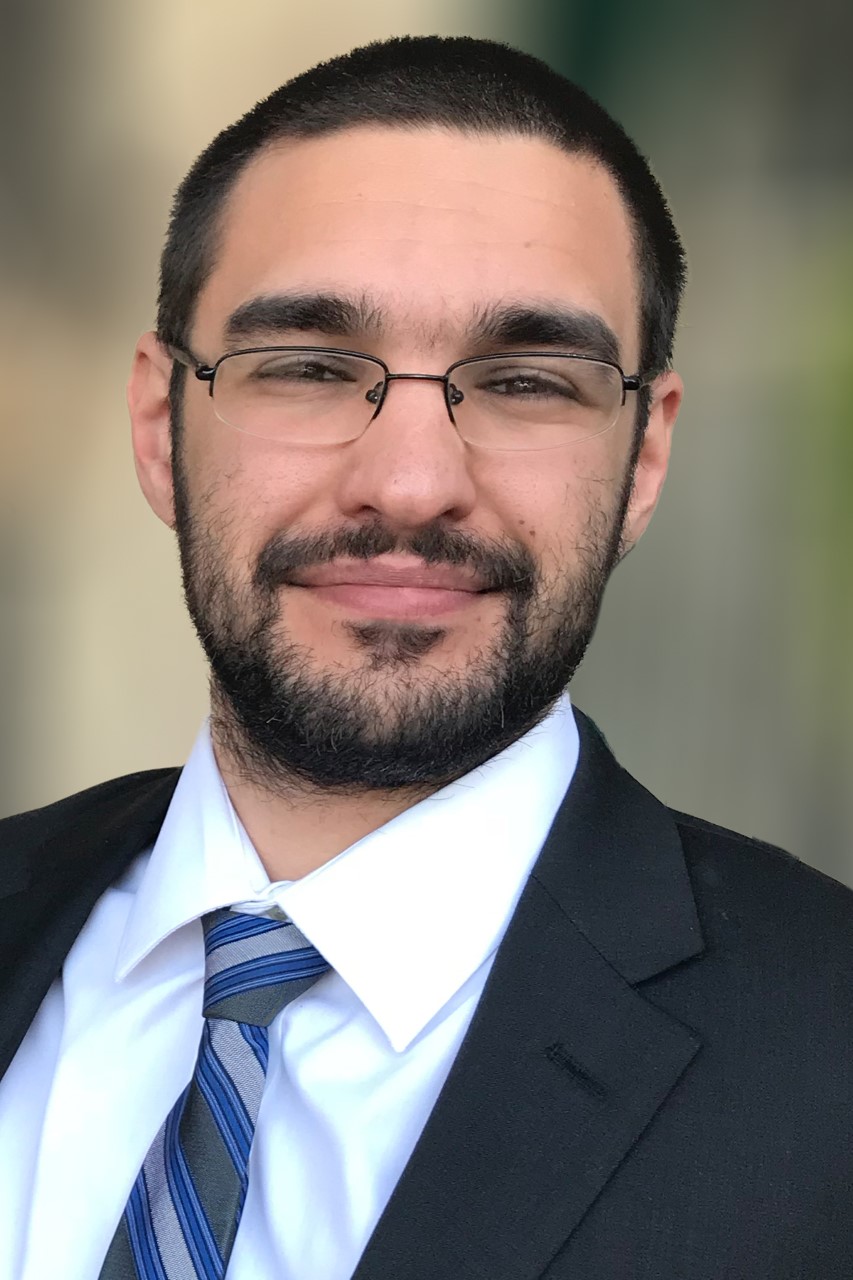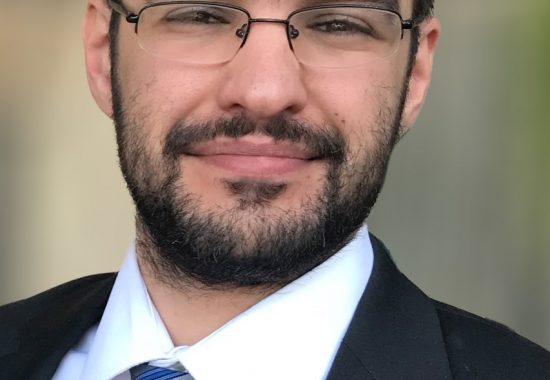
Harrison Stoll, MS, has been a lab manager at MRRI in the Cognition and Action Lab for about one year. In this interview, he tells us more about life in the lab, the fascinating research he is working on, his career, and some of his interests outside of science.
- How did you first become interested in science and rehabilitation research?
I would say that my interest in science stems from my natural desire to better understand the world we live in. In high school I always made sure to fill my elective slots with science classes as they really satisfied that innate curiosity. When I got to college, I knew I wanted to be in the sciences, but I was not sure where I wanted to fall in the field. I sampled a variety of different science classes my first couple semesters of college, but when I took introduction to psychology I was sold after the first week. I thought the study of human behavior, and some of the challenges associated with studying it, was fascinating. I remember on the first day my teacher did some basic memory and vision tasks with the class, to help demonstrate basic psychological principles, and it got me thinking about how the brain was able to execute these processes. It was the first subject I couldn’t stop thinking about, and that was a really good sign that I should continue with it.
As I went through college, I ended up participating in many different research projects that explored psychological fields to varying degrees. However, I was not really satisfied with only doing research in a testing room with pen, paper, and an undergraduate student. I began to explore other domains of psychology, for example neuropsychology, and I really loved the idea of using different methods and techniques to help support a theory. It is one thing to demonstrate that behavior lines up with your hypothesis, but when you can further supplement that with neuroimaging or patient data, it goes a long way in strengthening your theories. Additionally, I saw that your research could go further than basic science. You could end up working on a new treatment or better understand a neurological disorder, which could then help inform treatment, and that was a level of satisfaction I was not getting from my initial studies with undergraduate students.
- Can you tell us how you learned about MRRI and why you wanted to work here?
I learned about MRRI from my advisor at Villanova University, where I got my master’s degree in experimental psychology, Irene Kan, PhD. I knew that I wanted to eventually get my PhD after Villanova, but I really wanted the extra experience working with other populations and types of data than what you find in a typical university setting. Dr. Kan got an e-mail from Laurel Buxbaum, PsyD, the director of the lab I work in now, that she was hiring research assistants and passed it along to me. Although I did not have any previous experience with Dr. Buxbaum’s work, I quickly saw the overlap with my own interest in better understanding conceptual knowledge and how it is represented in the brain. That, along with it pushing me closer toward my goal of getting to work with different kinds of data, made this position seem like a natural fit.
- Looking back, what are some of the things you did before starting at MRRI that you think were key in preparing you for success in your current position?
I think one of the best things I did at my undergraduate university was take as many statistics classes as I could. It gave me a good foundation to learn the more advanced techniques we utilize in Dr. Buxbaum’s lab, such as mixed-level modeling and lesion-symptom mapping. Without that base knowledge, I would have really struggled to contribute to the lab in a meaningful way. Looking back on some of my accomplishments at MRRI, one of the reasons I was able to have an impact is because of my strong background in data analysis.
- What are your roles and responsibilities as a lab manager?
Since becoming lab manager I have taken on several different responsibilities that I did not have before as a research assistant (RA). I am the point person the other RAs come to with day-to-day problems that come up, such as issues with data entry or difficulty recruiting patients. I also help them prioritize their time, in conjunction with Dr. Buxbaum, and instruct them on our lab protocols (e.g., how recruitment of patients works, data entry/analysis, etc.). Outside of working with the other RAs, I help run our weekly lab meetings by keeping track of who is presenting and what are the major topics we need to discuss that day. Other lab members report to me if there is something they want to bring up to see if there is enough time to discuss it. Finally, Dr. Buxbaum also asks me to meet with her to discuss the status of ongoing projects and to find out if the lab has enough resources to start a new project.
5) What is the research project in the lab that you are most excited to be working on?
One of the projects we have been working on, for some amount of time now, has been collecting kinematic data on our gesture coding tasks. In our lab, one of the key tasks that we have participants engage in is a series of gesture tasks. There are two different types of gesture tasks, one where participants are to imitate a model making gestures, such as swinging a hammer, and another where they see a picture of a tool and then demonstrate to us how they would use it as if they were holding the object in their hand. Typically, the RAs will code the videos we record of people making the gestures, but recently we have been collecting kinematic data as well. One of the advantages of this approach is that it will give us a quantitative understanding of the participants’ movements, as opposed to the qualitative approach we use now. The hope is that the quantitative approach will converge with what we have been doing previously, while also possibly being more sensitive. It is possible that through this approach we might be able to better quantify how much worse patients are on these tasks compared to a neurotypical control group.
6) Can you give an example of how findings from the Cognition and Action Laboratory will have or have had an impact in the field or in clinical care?
We just recently had a paper, titled “Treating limb apraxia via action semantics”, accepted in Neuropsychological Rehabilitation which proposes a new treatment for apraxia. Apraxia has typically been defined with two different components: a deficit in translating sensory (visual, tactile, and proprioceptive) input into motor output and/or a deficit in the strength of memories of tool-use actions (called ‘action semantics’). Moreover, these components appear to be neuroanatomically distinct form one another. Most of the apraxia treatments thus far have focused on the sensory translation aspect, but in our study we focused on the action semantics by trying to strengthen the relationship between tools and action memories. While the sample size was small, we did find some evidence that the new treatment helps some individuals with apraxia, which is really promising. It will be interesting to see what the field does with this new treatment and how it might help further our understanding and rehabilitation efforts for individuals with apraxia.
7) What is one of the biggest challenges you face in your work?
I think one of the hardest parts of being in science is the number of different hats you must wear and how quickly you need to switch between those hats. For example, on a given day I might start by working with a patient, then jump to data analysis or trouble shooting some code that isn’t running correctly, transition to working on an abstract for a poster or paper, and then run to a meeting with other lab members where we discuss an upcoming projects. All those tasks require different skills, for example writing, coding, statistics, critical thinking, etc., and to be a successful researcher, one needs to be at least competent in all of them. It is certainly tricky at times to keep up with all of them, but it is also a challenge I relish. An aspect of research I enjoy the most is the breadth of techniques I am exposed to and must subsequently learn. It is satisfying to jump from task to task and not feel out of your element, regardless of the skills it requires you to perform.
8) Can you describe one of your research-related accomplishments that you are particularly proud of?
An accomplishment I am particularly proud of is getting so many papers published while at MRRI. Since I have been here, I have had two papers where I am either first or co-first author and another two papers as a middle author. To my knowledge, it is not exceedingly common for an RA or lab manager to author many publications while in a lab. Further, I have also done so on two papers that have clinical applications, such as the rehabilitation paper I mentioned earlier, and also papers that address theoretical questions. For example, I am co-first author with a post-doc in our lab, Dr. Frank Garcea, on a paper that looks at competition in the action domain. I think the experience of being a part of studies and writing papers on different aspects of research will really benefit me going forward in my career.
9) What is one of your favorite memories from your time at MRRI thus far?
I do not have one memory that sticks out, but I really enjoy the lab meetings we have. We have a great group of individuals with various backgrounds, and I think that makes for some interesting conversations. In other labs I have been in, sometimes the lab gets in a bubble, and group think starts to develop. You only only read articles in your field and talk with people who buy into the same ideas you do. At our current lab meetings, discuss papers from a wide variety of relevant research fields, including cognition, motor control, and language. I enjoy the discussions that come out of the papers we read or when someone presents data because of the diversity we have. Plus, the tone of lab meeting is not overly serious. We take research seriously, but we also have a fair number of laughs along the way. It has a good vibe, and it is something I look forward to every week, even during these crazy times with quarantine.
10) How do you like to spend your time when you’re not at work?
Outside of work, I really enjoy cooking. It is a different experience from sitting at your desk all day and writing code or reading papers. I get to use my hands and the creative side of my brain more. I enjoy trying to do as much from scratch as I can, whether that be grinding my own ground beef for meatballs or making a dough for wonton wrappers. Its also a nice way to destress after working as I find there this something cathartic about roasting vegetables. Building on that, I also enjoy trying new restaurants in Philadelphia, and there are tons of great ones to chose from. My girlfriend and I really enjoy Vedge and Charlie was a Sinner, as she is a vegetarian, so it makes it easier to order for us both.


2 comment on “Meet MRRI Lab Manager Harrison Stoll”